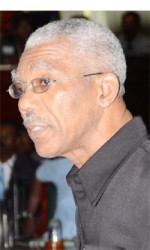The main opposition, APNU, is not prepared to have local government polls held under the current laws, the coalition’s leader David Granger says.
“No,” he bluntly stated when the question was put to him by Stabroek News yesterday. “We are working to ensure that the laws are changed,”

he added. Pointing to the work done for the reform of the system, he said that the changes in four new Bills are not ornamental and are vital for democracy.
He reiterated that APNU is not prepared to have local government polls under the present laws.
The opposition leader pointed out that under current laws, the Local Government Minister has been removing elected Neighbourhood Democratic Councils and installing hand-picked In-terim Management Commit-tees.
Prospects for local government elections this year are looking increasingly slim and over the weekend, AFC Leader Khemraj Ramjattan told Stabroek News that he is open to the polls being held under the present laws while final agreement is hammered out on four bills packed with reforms.
The four local government bills seen as crucial for the holding of the polls are in limbo with Minister of Local Government Ganga Persaud silent on whether he would present them to the House before the parliamentary recess begins.
“I don’t know sir, I am overseas,” was the minister’s response when contacted by Stabroek News on Sunday and asked whether he would be present at the next sitting of the National Assembly on August 7 to present the bills. Government has twice deferred the second reading of the four bills.
On the last occasion, the government shelved its parliamentary business after a failed bid to force an adjournment of the National Assembly’s sitting to win consensus with the opposition on the contentious Amaila Falls Hydropower Project.
Yesterday, at the ruling PPP’s weekly press conference, Minister of Home Affairs Clement Rohee was asked about holding local government polls under the current laws. He responded that he did not think it would be right for him to pronounce on whether the government would be prepared to go forward under the current laws. He said the question should be directed to Head of the Presidential Secretariat Dr Roger Luncheon or President Donald Ramotar. “But at Freedom House I would not want to say anything on that at this time,” Rohee stated.
Attempts to contact Presidential Advisor on Governance Gail Teixeira yesterday were futile. The next sitting of the National Assembly is scheduled for August 7, three days before the start of the two-month annual parliamentary recess on August 10 and if the bills are not passed then and assented to by the President, local government elections would be unlikely this year.
Last month, western missions and a host of institutions here issued a joint statement saying that the path is now clear for the approval of four key bills that would pave the way for local government elections and urging all parties and civil society to take the process to conclusion.
The last local government elections were held in 1994.
“After months of debate, hard work, and compromise, the parliamentary Select Committee on Local Government has forged agreement on the four bills necessary to establish a more modern and effective system of local governance.
This is a significant and positive step forward. We welcome this action on the part of Guyana’s elected representatives to come together in the national interest,” the statement had said.
“The path is now clear for approval of these four bills in the National Assembly before the upcoming annual recess. We encourage all parties, with the support of civil society, to build on the constructive progress and goodwill thus far achieved to complete these vital pieces of legislation in the coming days so that technical preparations for local government elections can begin as soon as possible,” it added.
The statement followed another earlier this year in which the four key western missions in Guyana called for the holding of local government elections, saying that there is no valid justification for further delay, which they said is responsible for a persistent drag on Guyana’s national development.




